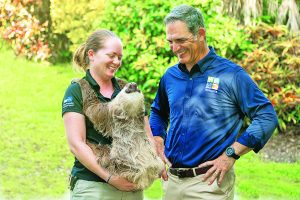|
Getting your Trinity Audio player ready...
|

“Hey, Papi, what’s that dinosaur doing by the pool?”
Ah, South Florida – a tropical paradise where palm trees sway, the sun shines, and your backyard barbecue might just turn into a scene from “Animal Planet.”
While we all love grilling in the backyard, some uninvited guests have decided to crash the party: invasive species. From iguanas to pythons and peacocks, it seems like our backyards are turning into the latest hotspots for exotic wildlife encounters. Grab your bug spray and let’s dive into the wild world of invasive species in our South Florida backyards.
The Great Iguana Showdown
Picture this: you’re flipping fritas on the grill, and suddenly, you’re faced with an unexpected stare-down – not with your neighbor, but with a bright green iguana perched on your fence like it’s judging your skills. These nonchalant reptiles have taken over the region, with some growing to lengths that make you question whether you accidentally entered the set of a Jurassic Park sequel. And when the temperatures drop, so do they.
The Burmese Python Parade
In a land where the Everglades reign supreme, it was only a matter of time before they became the playground for some unwelcome guests. Enter the Burmese python, a constricting creature that’s giving anacondas a run for their money. These snakes have made themselves right at home, feasting on native wildlife as if it’s Noche Buena in Hialeah. Forget about peeking behind the bushes for hidden eggs – you might just stumble upon a python family reunion.
Peacocks – The Royal Turkey
The Spanish word for peacock is pavo real, Royal Turkey. These flamboyant feathered invaders have decided to strut their stuff in the Sunshine State like they’re performing at the Calle Ocho parade. From showing up uninvited to pool parties to conducting impromptu fashion shows on your roof, these peacocks are redefining what it means to be a true Floridian.
Forget about gators – it’s the peacocks you need to watch out for. Will they steal your pets’ snacks? Will they leave artistic markings on your car with their classy claws? Stay tuned for the latest episode of “Peacocks Gone Wild: Florida Edition” – the reality show we never knew we needed.
Agama-geddon, The Rise of the African Agama
Move over, iguanas – there’s a new lizard in town, and they’re not just here to sunbathe. South Florida, known for its beautiful beaches and sunny weather, has become the unexpected battleground for a hilarious invasion of agama lizards. These pint-sized reptiles are taking the term “colorful characters” to a whole new level as they scamper through our neighborhoods and turn our gardens into their personal playgrounds pushing out the local, native species.
Conclusion
As South Floridians, we’ve learned to embrace the quirks of our unique ecosystem – even if that means sharing our backyards with some unexpected guests. From iguanas to pythons and gators to peacocks, our barbecues are never boring. So, the next time you fire up the grill (or the caja china), be prepared for a wild party where the guest list includes both the expected and the exotic. After all, it’s all part of the adventure of living in the Sunshine State.Advice From the Pro: Rob Lara, Zoo Miami Interactive Programs Manager
It’s not their fault. So many of the species we see in South Florida seem out of place because they are naturally from other regions of the world. But they didn’t walk here.
These animals were brought here as pets and then were introduced into Florida when they either got too big and were released by their owners or escaped. I’d like to ask everyone, on behalf of our native wildlife, to at least not make this problem worse. The first step to not contributing to the overwhelming number of non-native animals is to never let your pets loose and be proactive with your pet choices.
Before bringing any pet home for yourself or your family, make sure you know these five things about the animal you are adding to your family:
Where does this animal come from?
This will help to ensure you understand what temperature and humidity requirements they have. Can you afford to buy light bulbs, misters, and a proper enclosure?
Make sure you know how big the animal will get.
If you feed it, it will grow. Find out what an adult looks like and make sure you can take care of that size animal before you bring home a baby.
What the animal eats?
Does it eat veggies? Bugs? Veggies and bugs? Make sure you have “the stomach” to feed your pet what they need (especially if you want a snake).
How long the animal will live?
Hamsters are cute, but they only live like two years. It’s just how hamsters do! Some parrots and tortoises can live a really long time.
How active the animal is and when it is active?
Make sure you know how much work the animal is before you bring it home. Especially if you are giving it as a gift. Spoiler alert – tortoises are actually pretty high energy, hedgehogs are active at night, and many pet snakes do indeed like to cuddle.
For specific questions about wildlife that we hear all the time, I created a portion of our website to help you in your time of need! Head over to zoomiami.org/saving-wildlife or use the drop-down menu to select “Saving Wildlife” and scroll down to the Wildlife Advice section. If you have a question not answered there – use the contact us section at the bottom of our website. Yes, questions get answered there! All wildlife questions come to me! Here is what we have about invasive animals.
I found an invasive animal. What should I do?
• Call the FWC Exotic Species Hotline 1-888-IVE GOT1 (483-4681)
• If you have a smartphone, one of the best ways to report a potentially invasive species is with the IveGot1 app that is available for free at the major app stores.
• The app will allow you to take a picture, record the location, and add any notes to the sighting. It will immediately notify the appropriate agency personnel in case they would need to take action. The app also contains a lot of information on different invasive species that may allow you to identify what you are seeing.
• You can also record invasive species sightings at https://www.eddmaps.org/
• Large snakes and lizards should be reported to FWC’s invasive species hotline. Call 888-IVE GOT1 (483-4681) and follow the prompts.
• They also have great resources on their website like “Managing iguanas on your own property” and “Burmese Python information and removal opportunities.” Be sure to head over to their website https://myfwc.com/wildlifehabitats/nonnatives/ and scroll down to the “Popular Topics” section.
FWC’s Exotic Species Hotline
Phone: 888-Ive-Got1 (483-4681)
Website: https://myfwc.com/wildlifehabitats/nonnatives/
Jose C. Romano is president and CEO, Zoo Miami Foundation.
ABOUT US:
For more Miami community news, look no further than Miami Community Newspapers. This Miami online group of newspapers covers a variety of topics about the local community and beyond. Miami’s Community Newspapers offers daily news, online resources, podcasts and other multimedia content to keep readers informed. With topics ranging from local news to community events, Miami’s Community Newspapers is the ideal source for staying up to date with the latest news and happenings in the area.
This family-owned media company publishes more than a dozen neighborhood publications, magazines, special sections on their websites, newsletters, as well as distributing them in print throughout Miami Dade County from Aventura, Sunny Isles Beach, Miami Beach, Coral Gables, Brickell, Coconut Grove, Pinecrest, South Miami, Kendall, Palmetto Bay, Cutler Bay and Homestead. Each online publication and print editions provide comprehensive coverage of local news, events, business updates, lifestyle features, and local initiatives within its respective community.
Additionally, the newspaper has exclusive Miami community podcasts, providing listeners with an in-depth look into Miami’s culture. Whether you’re looking for local Miami news, or podcasts, Miami’s Community Newspapers has you covered. For more information, be sure to check out: https://communitynewspapers.com.
If you have any questions, feel free to email Michael@communitynewspapers.com or Grant@communitynewspapers.com.





